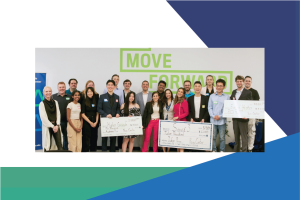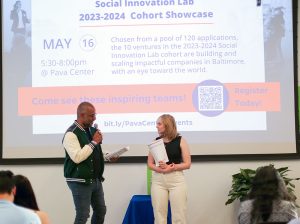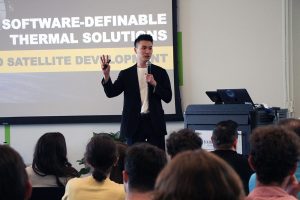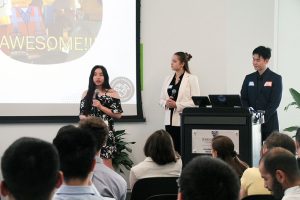
The Pava Marie LaPere Center for Entrepreneurship, formerly Fast Forward U, hosted its first Fuel Demo Day since the recent dedication and renaming. The spring cohort’s Demo Day for its upper-level student venture accelerator was a crowded and lively event, where 10 teams presented their innovations before an audience of more than 150 in person and online.
Paul Davidson, assistant director of student ventures, guided the presentations and the audience’s participation throughout the evening, adding: “I am proud to have worked with all 10 teams in Fuel this semester. They grew tremendously by supporting one another, taking advice and feedback from mentors, guest speakers and weekly meetings with their strategic advisers. The entire Pava Center team looks forward to continuing our support of each team as they navigate the challenging but thrilling aspects of being entrepreneurs. Many of these innovations will lead to stronger outcomes and solutions for patients and consumers, and for the markets in which they are working.”
Fuel is a semester long accelerator program running twice every year that equips Johns Hopkins University student startups for long-term success and provides mentorship connection to a vast alumni network. The extracurricular program includes a focus on customer acquisition, marketing development and entrepreneurial finance, but most importantly, it is designed each year to support specific needs of the participating teams.
The cohort teams meet twice per week and engage with staff members, strategic advisers and industry mentors, in addition to guest speakers. Each team is also connected with at least three mentors for one-on-one advising. The much-anticipated conclusion to each accelerator is Demo Day, during which teams showcase their technology and products to judges and an audience of entrepreneurs, investors and supporters.
Fuel Demo Day Judges
 Rebecca Rosenberg (pictured) JHU MSE ’22, is founder and CEO of ReBokeh Vision Technologies. Rosenberg has completed and succeeded in several local accelerators, including Fuel, Towson StartUP, and Techstars. ReBokeh is based in Baltimore, and is very involved in the Pava Center and the broader entrepreneurship ecosystem.
Rebecca Rosenberg (pictured) JHU MSE ’22, is founder and CEO of ReBokeh Vision Technologies. Rosenberg has completed and succeeded in several local accelerators, including Fuel, Towson StartUP, and Techstars. ReBokeh is based in Baltimore, and is very involved in the Pava Center and the broader entrepreneurship ecosystem.
Adam Phillips (pictured) is managing director of the Techstars Equitech Accelerator, a program several Fuel alumni have participated in. Phillips spent several years working as a senior attorney and director at the United States Department of Justice, Congress and Department of Transportation. He is also a founder and is very involved in the Baltimore tech ecosystem.
Yair Flicker, BS/MSE ’06, is founder and president of SmartLogic, a consulting company that builds custom web and mobile-based software. SmartLogic is a Baltimore-based company, and Flicker is active in the Baltimore tech and entrepreneurship ecosystem.
Wendy Bolger is director of the Simon Center for Innovation & Entrepreneurship at Loyola University Maryland. Bolger’s career has spanned public and private sectors, including as an entrepreneur. Loyola and the Pava Center collaborate to expand entrepreneurship opportunities for students across the Baltimore region.
For this spring accelerator, 50 teams applied, and 10 were accepted. Several teams have progressed throughout the spring semester following their December 2023 Demo Day. Two current Fuel teams (Meloscene and Squid 3 Space) also competed at the Carey Business School Venture Showcase on April 30. Of the seven remaining teams competing at Carey’s showcase this year, four completed Fuel’s fall accelerator in 2023.
Each team participating in the Fuel accelerator receives a $5,000 stipend, and teams are chosen by a team of judges, the audience and their fellow cohort members to receive additional prize money. At the end of the event, the grand prize, selected by the judges, the cohort prize chosen by fellow founders, and the attendees’ audience prize are all revealed.

Fuel Spring Cohort 2024
Squid3 Space (pictured), from WSE graduate student, Warren Su, was chosen for the grand prize of $12,000 by the four judges. A satellite thermal control software system, Squid3 can also be used in greenhouses on Earth to control temperatures. Squid3 Space also presented their innovation at the Carey Business School’s Venture Showcase evening on April 30.

Higher Grounds (pictured), from WSE undergraduates Stone Meng, Taliyah Huang, and Marco Azar, won the audience award of $5,000. Their vending machines will be available 24/7 and strategically placed in central locations throughout the Johns Hopkins University campus. In the years ahead, they plan to move to other college campuses throughout the U.S.
Evoked Haptics, from WSE PhD student Arik Slepyan and Jon Socha, MSE ’23 alumni, was awarded the Cohort Prize of $3,000. They deliver noninvasive and naturalistic illusions of touch for consumer and medical applications using a wearable electrical stimulator, for those who have lost limbs or are facing neurological challenges.
CellMind, led by Alfred Landik (Carey, MBA): Developing a platform for next-generation cell therapy success. The company’s current focus is CAR-T therapy. It has been approved as fourth-line treatment for blood cancers; however, the therapy is still extremely risky. Improvements to this cell therapy are desperately needed, particularly novel, innovative technologies that are tailored to this novel therapeutic class. Improved patient selection is critical to successful CAR-T outcomes and better patient health.
ComplexDX, led by Allyson Chiu (WSE undergraduate): Over 14 million Americans experience acute respiratory illnesses annually, and the misdiagnosis of these lead to patients needing to retest multiple times, creating a significant financial burden and delaying time to treatment. ComplexDx creates a multiplexed respiratory pathogen-detecting device that can detect up to 12 respiratory pathogens at once using one saliva sample, in under 30 minutes.
Meloscene, led by Julie Gerber (Carey, MBA): Their spatial computing platform revolutionizes music creation into a collaborative and socially connected experience, featuring virtual studios where artists can co-create, share and grow within a supportive musical community. Seamlessly integrating popular tools with real instruments, their patent-pending technology streamlines workflows and enables musicians and fans to engage together in a creative, interactive process that fosters a vibrant and accessible music ecosystem. Meloscene also competed at the Carey Business School Venture Showcase on April 30.
OrgoTree, led by Joseph Kim (KSAS undergraduate): is an accessible way to simplify organic chemistry. In doing so, OrgoTree addresses the pace of pharmaceutical synthesis, limited by the human capacity to devise cost-effective reactions. OrgoTree aims to fulfill this need via computerization without a steep learning curve.
Periphero, led by Erica Lee (Ph.D., SOM): Developing long-acting, injectable drug delivery system for local, sustained release of insulin-like growth factor 1 to improve outcomes following peripheral nerve injury.
Protean Robotics, led by Stephen Daire (WSE, graduate student): Creating modular robotic hardware and software for multiple applications.
WellCheq, led by Jodi Miller (SOE, postdoc): A web-based app that enables students to complete an emotional check-in. The goal is to make it easier for students to ask for support and then provide educators with insight into the needs of their learners.
The Pava Center’s accelerators run each semester. Fuel’s next application cycle will open in August for an early September 2024 start date.